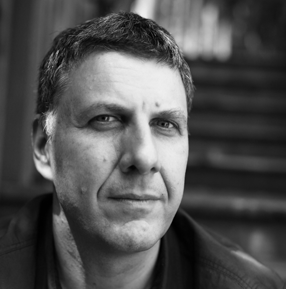The yellow flowers on the grave
make an arch, they lie
on a black stone that lies on the ground
like a black door that will always
remain closed down into the earth,
into it is etched the name
of a great poet who believed
he had nothing more to say,
he threw himself into literal water
and everyone has done their mourning
and been mourned over, and we all
went on with our shopping,
I stare at this photograph of that grave
and think you died like him,
like all the others,
and the yellow flowers
seem angry, they seem to want to refuse
to be placed anywhere but in a vase
next to the living, someday
all of us will have our names
etched where we cannot read them,
she who sealed her envelopes
full of poems about doubt with flowers
called it her “granite lip,” I want mine
to say Lucky Life, and what would
a perfect elegy do? place the flowers
back in the ground? take me
where I can watch him sit eternally
dreaming over his typewriter?
then, at last, will I finally unlearn
everything? and I admit that yes,
while I could never leave
everyone, here at last
I understand these yellow flowers,
the names, the black door
he held open
and you walked through.
Copyright © 2023 by Matthew Zapruder. Originally published in Poem-a-Day on April 18, 2023, by the Academy of American Poets.
“The ‘great poet’ whose grave is mentioned in this poem is Paul Celan. He took his own life in Paris in 1970. Emily Dickinson, who referred to her own gravestone as her ‘granite lip,’ and Gerald Stern, whose ‘Lucky Life’ I would like read at my funeral, also appear. The ‘you’ addressed is not one person, but several people. I want to understand them, and want to hold onto them, but have no choice but to let them go.”
—Matthew Zapruder

